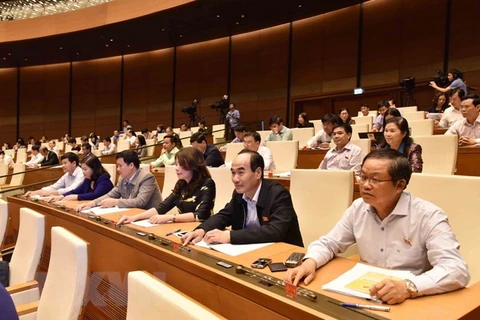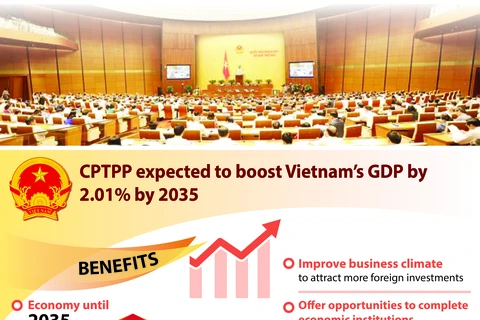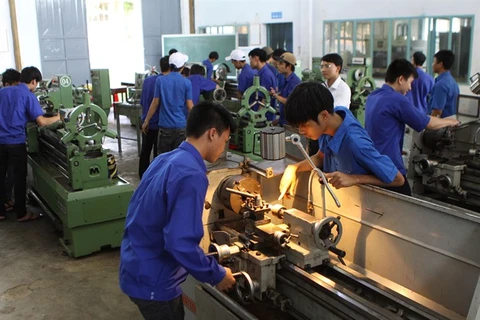 Trade ministers of 11 countries participating in the trade pact, namely Australia, Brunei, Canada, Malaysia, Mexico, Japan, New Zealand, Peru, Singapore and Vietnam, at the signing ceremony on March 8, 2018. (Photo: VNA)
Trade ministers of 11 countries participating in the trade pact, namely Australia, Brunei, Canada, Malaysia, Mexico, Japan, New Zealand, Peru, Singapore and Vietnam, at the signing ceremony on March 8, 2018. (Photo: VNA) Hanoi (VNA) – Vietnam ought to run an action programme which will enable the country to take full advantage of opportunities and overcome challenges from the Comprehensive and Progressive Agreement for Trans-Pacific Partnership (CPTPP), thus bringing great benefits to its enterprises and people, experts have said.
According to them, what ultimately determines the success of the culminant integration process are efforts to accelerate institutional reform, improving competitiveness to reach leading standards of a modern and integrated market economy in line with the 12th Party Congress’ resolution.
The Government assigned the Ministry of Justice to coordinate with relevant ministries and agencies in reviewing existing laws, ordinances and decrees, as well as propose amendments and issue new ones in line with trade-pact commitments.
Results of the review showed that of the 265 legal documents reviewed, the total number of laws proposed for amendment and supplementation is seven; 15 commitments and group of commitments were proposed to directly apply; and three international treaties in the field of intellectual property were recommended to join.
In order to implement the commitments in the CPTPP, Vietnam will have to adjust and amend some legal provisions on trade, customs, intellectual property, and labour.
Vietnam’s experience in joining the World Trade Organisation (WTO) has shown that with serious preparation and an increased effectiveness, the country can successfully do this workload, especially when it is allowed to do following a specific roadmap.
Additionally, the Government needs to continue accelerating the restructuring of national economy and State-owned enterprises, promote reform and the simplification of administrative procedures, create synergies among ministries and sectors to enhance the competitiveness of the business environment, and fostering cooperation among domestic and foreign enterprises.
Chairman of the the Vietnam Chamber of Commerce and Industry Vu Tien Loc suggested that the Government focus on implementing an action programme, which needs to meet at least three basic requirements related to the building of policies and laws, the outline of specific plans for the implementation, and the support for parties that affected by the agreement.
According to Loc, the action programme must develop all possible scenarios to take the initiative in fulfilling CPTPP commitments and, at the same time, consult stakeholders to assess the impact of each scenario and what Vietnam will lose if it fails to meet said commitments.
The programme should take into account plans for each stage of CPTPP enforcement, keeping in mind not only compliance with the pact, but also maintaining attainable goals for the economy and business community, the official noted.
He added further that it should also include actions to support businesses affected by the CPTPP, particularly micro-, small- and medium-sized enterprises, as well as those vulnerable in rural and agricultural sectors. If these businesses are not beneficial, the enforcement of the deal could be a failure, he said.
Enterprises are advised to actively explore more information about the trade pact to fully comprehend Vietnam’s commitments and partner markets, especially those related to tariff preferences for Vietnam’s main commodities and possible export items.
They should be active in seeking cooperation opportunities with foreign partners to attract more investment into Vietnam, as well as in joining regional and global supply chains. –VNA
VNA
























